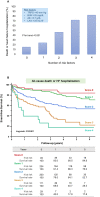Long-Term Clinical Outcomes in Patients With Severe Tricuspid Regurgitation
- PMID: 36565178
- PMCID: PMC9973603
- DOI: 10.1161/JAHA.122.025751
Long-Term Clinical Outcomes in Patients With Severe Tricuspid Regurgitation
Abstract
Background The natural history and optimal interventional timing in patients with isolated severe tricuspid regurgitation (TR) have not been well studied. This study aimed to investigate long-term clinical outcomes and risk factors associated with poor prognosis in patients with isolated severe TR. Methods and Results Consecutive transthoracic echocardiographic examinations in 2877 patients with isolated severe TR were retrospectively reviewed. Patients with significant left-sided valve disease or repeated examinations were excluded. Primary outcome was defined as a composite of all-cause death and hospitalization for heart failure. Among the 613 enrolled patients (mean age, 74±13 years; men, 38%), 141 died, and 62 were hospitalized for heart failure during the median follow-up period of 26.5 (interquartile range, 6.0-57.9) months. The 5-year event-free rate was 60.1%. TR pressure gradient (adjusted hazard ratio [HR], 1.03 [95% CI, 1.01-1.04]), blood urea nitrogen (adjusted HR, 1.02 [95% CI, 1.01-1.04]), left atrial volume index (adjusted HR, 1.01 [95% CI, 1.002-1.02]), and serum albumin (adjusted HR, 0.56 [95% CI, 0.36-0.95]) were identified as independent predictors of adverse events. A risk model based on the 4 clinical factors that included pulmonary hypertension (TR pressure gradient >40 mm Hg), elevated blood urea nitrogen levels (>25 mg/dL), decreased albumin levels (<3.7 g/dL), and left atrial enlargement (left atrial volume index <34 mL/m2) revealed a graded increase in the risk of adverse events (P<0.001). Conclusions The prognosis of isolated severe TR is not always favorable. Careful attention should be paid to patients with concomitant risk factors, such as pulmonary hypertension, elevated blood urea nitrogen levels, decreased albumin levels, and left atrial enlargement.
Keywords: heart failure; prognosis; surgery; tricuspid regurgitation; valvular heart disease.
Figures




References
-
- Otto CM, Nishimura RA, Bonow RO, Carabello BA, Erwin JP III, Gentile F, Jneid H, Krieger EV, Mack M, McLeod C, et al. 2020 ACC/AHA guideline for the Management of Patients with valvular heart disease: a report of the American College of Cardiology/American Heart Association joint committee on clinical practice guidelines. Circulation. 2021;143:e35–e71. doi: 10.1161/CIR.0000000000000932 - DOI - PubMed
-
- Dreyfus J, Ghalem N, Garbarz E, Cimadevilla C, Nataf P, Vahanian A, Caranhac G, Messika‐Zeitoun D. Timing of referral of patients with severe isolated tricuspid valve regurgitation to surgeons (from a French nationwide database). Am J Cardiol. 2018;122:323–326. doi: 10.1016/j.amjcard.2018.04.003 - DOI - PubMed
MeSH terms
Substances
LinkOut - more resources
Full Text Sources
Medical

